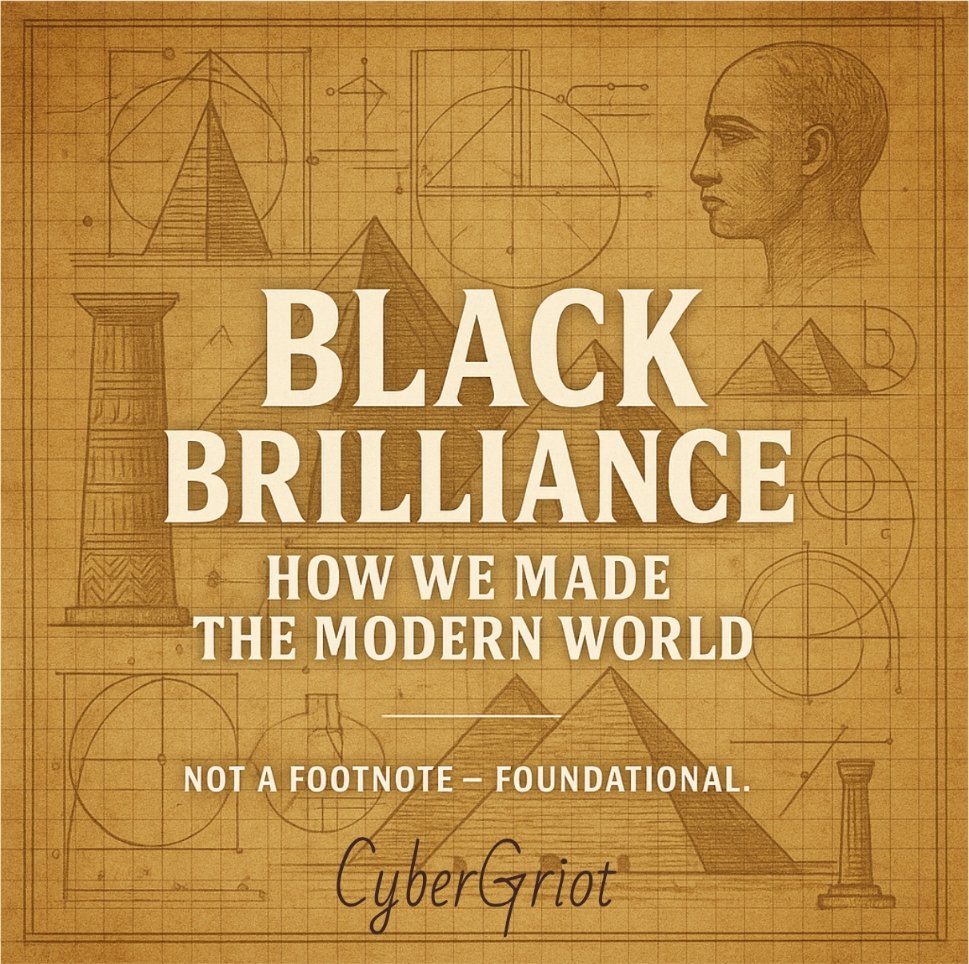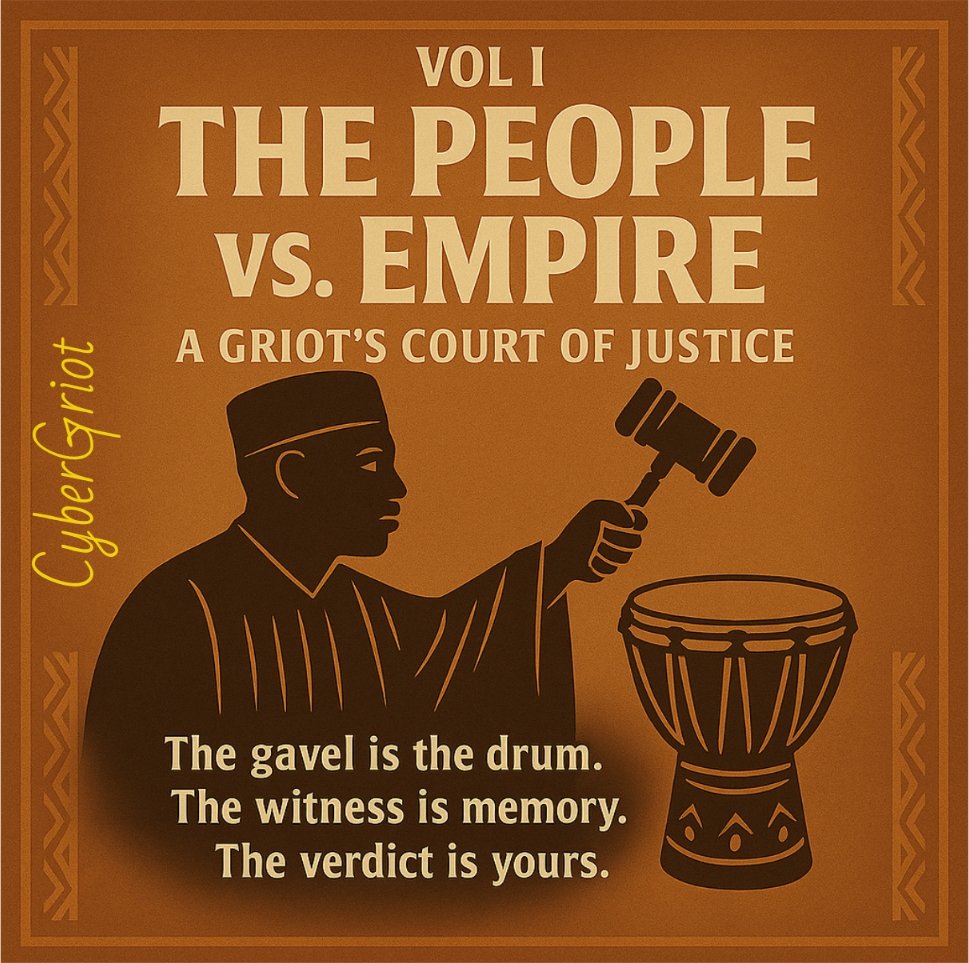
Black Brilliance: How We Made the Modern World is a bold, ongoing audio-visual journey that honors the often-erased legacy of Black scientists, engineers, mathematicians, inventors, coders, and healers—from ancient times to the digital age. This multi-volume sonic archive reclaims our rightful place in the blueprint of progress, reminding the world that Black minds didn’t just contribute to civilization—we built it.
Spanning sacred geometry and space travel, iron forges and fiber optics, cosmology and code, Black Brilliance is more than history—it’s living testimony. Through spoken word, Afrobeat-infused compositions, archival storytelling, and poetic narration, each track embodies the spirit of innovators like Imhotep, Katherine Johnson, Granville T. Woods, Timnit Gebru, and many more. Their inventions, insights, and indomitable will laid the foundation for everything from GPS and gas masks to heart surgery and home computing.
This series doesn’t just look back—it reaches forward. It ends each volume with a call: to remember, to rebuild, and to rise. With each chapter, it declares that Black brilliance is not exceptional—it is ancestral. It is not marginal—it is central.
Because the modern world, with all its code and circuitry, light and logic, runs on our spark.
And that brilliance still burns.


Black Brilliance: How We Made the Modern World is a bold, ongoing audio-visual journey that honors the often-erased legacy of Black scientists, engineers, mathematicians, inventors, coders, and healers—from ancient times to the digital age. This multi-volume sonic archive reclaims our rightful place in the blueprint of progress, reminding the world that Black minds didn’t just contribute to civilization—we built it.
Spanning sacred geometry and space travel, iron forges and fiber optics, cosmology and code, Black Brilliance is more than history—it’s living testimony. Through spoken word, Afrobeat-infused compositions, archival storytelling, and poetic narration, each track embodies the spirit of innovators like Imhotep, Katherine Johnson, Granville T. Woods, Timnit Gebru, and many more. Their inventions, insights, and indomitable will laid the foundation for everything from GPS and gas masks to heart surgery and home computing.
This series doesn’t just look back—it reaches forward. It ends each volume with a call: to remember, to rebuild, and to rise. With each chapter, it declares that Black brilliance is not exceptional—it is ancestral. It is not marginal—it is central.
Because the modern world, with all its code and circuitry, light and logic, runs on our spark.
And that brilliance still burns.


Black Brilliance: How We Made the Modern World is a bold, ongoing audio-visual journey that honors the often-erased legacy of Black scientists, engineers, mathematicians, inventors, coders, and healers—from ancient times to the digital age. This multi-volume sonic archive reclaims our rightful place in the blueprint of progress, reminding the world that Black minds didn’t just contribute to civilization—we built it.
Spanning sacred geometry and space travel, iron forges and fiber optics, cosmology and code, Black Brilliance is more than history—it’s living testimony. Through spoken word, Afrobeat-infused compositions, archival storytelling, and poetic narration, each track embodies the spirit of innovators like Imhotep, Katherine Johnson, Granville T. Woods, Timnit Gebru, and many more. Their inventions, insights, and indomitable will laid the foundation for everything from GPS and gas masks to heart surgery and home computing.
This series doesn’t just look back—it reaches forward. It ends each volume with a call: to remember, to rebuild, and to rise. With each chapter, it declares that Black brilliance is not exceptional—it is ancestral. It is not marginal—it is central.
Because the modern world, with all its code and circuitry, light and logic, runs on our spark.
And that brilliance still burns.


But I must explain to you how all this mistaken idea of denouncing pleasure and praising pain was born and I will give you a complete account of the system, and expound the actual teachings of the great explorer of the truth, the master-builder of human happiness.


The People vs. Empire: A Griot’s Court of Justice is a groundbreaking spoken word album and narrative courtroom drama that puts 500 years of colonialism, slavery, imperialism, and cultural erasure on trial. Told through the voice of a griot-judge and poetic prosecutors, the album journeys across volumes—“The Crimes of the Empire,” “The Lies of Civilization,” and “The Empire in the Shadows” etc—exposing the brutal truths hidden behind conquest and so-called progress.
Each track is a living testimony: from the Middle Passage and stolen lands, to puppet governments, corporate theft, and psychological warfare. Through historical evidence, dramatized witness accounts, and Afrocentric sound design, the project resurrects ancestral memory and invites modern audiences to reflect, remember, and rise.
With its tagline—“The gavel is the drum. The witness is memory. The verdict is yours.”—this work reclaims African narrative authority, honors the fallen, and confronts power with clarity. But it doesn’t stop at indictment. It ends with a people’s verdict: a call for reparations, unity, and rebirth.
The People vs. Empire is not just an album. It is a reckoning. A ceremony. A fire lit for future volumes. The case is not closed. The griot will return.


The People vs. Empire: A Griot’s Court of Justice is a groundbreaking spoken word album and narrative courtroom drama that puts 500 years of colonialism, slavery, imperialism, and cultural erasure on trial. Told through the voice of a griot-judge and poetic prosecutors, the album journeys across volumes—“The Crimes of the Empire,” “The Lies of Civilization,” and “The Empire in the Shadows” etc—exposing the brutal truths hidden behind conquest and so-called progress.
Each track is a living testimony: from the Middle Passage and stolen lands, to puppet governments, corporate theft, and psychological warfare. Through historical evidence, dramatized witness accounts, and Afrocentric sound design, the project resurrects ancestral memory and invites modern audiences to reflect, remember, and rise.
With its tagline—“The gavel is the drum. The witness is memory. The verdict is yours.”—this work reclaims African narrative authority, honors the fallen, and confronts power with clarity. But it doesn’t stop at indictment. It ends with a people’s verdict: a call for reparations, unity, and rebirth.
The People vs. Empire is not just an album. It is a reckoning. A ceremony. A fire lit for future volumes. The case is not closed. The griot will return.


The People vs. Empire: A Griot’s Court of Justice is a groundbreaking spoken word album and narrative courtroom drama that puts 500 years of colonialism, slavery, imperialism, and cultural erasure on trial. Told through the voice of a griot-judge and poetic prosecutors, the album journeys across volumes—“The Crimes of the Empire,” “The Lies of Civilization,” and “The Empire in the Shadows” etc—exposing the brutal truths hidden behind conquest and so-called progress.
Each track is a living testimony: from the Middle Passage and stolen lands, to puppet governments, corporate theft, and psychological warfare. Through historical evidence, dramatized witness accounts, and Afrocentric sound design, the project resurrects ancestral memory and invites modern audiences to reflect, remember, and rise.
With its tagline—“The gavel is the drum. The witness is memory. The verdict is yours.”—this work reclaims African narrative authority, honors the fallen, and confronts power with clarity. But it doesn’t stop at indictment. It ends with a people’s verdict: a call for reparations, unity, and rebirth.
The People vs. Empire is not just an album. It is a reckoning. A ceremony. A fire lit for future volumes. The case is not closed. The griot will return.


The People vs. Empire: A Griot’s Court of Justice is a groundbreaking spoken word album and narrative courtroom drama that puts 500 years of colonialism, slavery, imperialism, and cultural erasure on trial. Told through the voice of a griot-judge and poetic prosecutors, the album journeys across volumes—“The Crimes of the Empire,” “The Lies of Civilization,” and “The Empire in the Shadows” etc—exposing the brutal truths hidden behind conquest and so-called progress.
Each track is a living testimony: from the Middle Passage and stolen lands, to puppet governments, corporate theft, and psychological warfare. Through historical evidence, dramatized witness accounts, and Afrocentric sound design, the project resurrects ancestral memory and invites modern audiences to reflect, remember, and rise.
With its tagline—“The gavel is the drum. The witness is memory. The verdict is yours.”—this work reclaims African narrative authority, honors the fallen, and confronts power with clarity. But it doesn’t stop at indictment. It ends with a people’s verdict: a call for reparations, unity, and rebirth.
The People vs. Empire is not just an album. It is a reckoning. A ceremony. A fire lit for future volumes. The case is not closed. The griot will return.


The People vs. Empire: A Griot’s Court of Justice is a groundbreaking spoken word album and narrative courtroom drama that puts 500 years of colonialism, slavery, imperialism, and cultural erasure on trial. Told through the voice of a griot-judge and poetic prosecutors, the album journeys across volumes—“The Crimes of the Empire,” “The Lies of Civilization,” and “The Empire in the Shadows” etc—exposing the brutal truths hidden behind conquest and so-called progress.
Each track is a living testimony: from the Middle Passage and stolen lands, to puppet governments, corporate theft, and psychological warfare. Through historical evidence, dramatized witness accounts, and Afrocentric sound design, the project resurrects ancestral memory and invites modern audiences to reflect, remember, and rise.
With its tagline—“The gavel is the drum. The witness is memory. The verdict is yours.”—this work reclaims African narrative authority, honors the fallen, and confronts power with clarity. But it doesn’t stop at indictment. It ends with a people’s verdict: a call for reparations, unity, and rebirth.
The People vs. Empire is not just an album. It is a reckoning. A ceremony. A fire lit for future volumes. The case is not closed. The griot will return.


The People vs. Empire: A Griot’s Court of Justice is a groundbreaking spoken word album and narrative courtroom drama that puts 500 years of colonialism, slavery, imperialism, and cultural erasure on trial. Told through the voice of a griot-judge and poetic prosecutors, the album journeys across volumes—“The Crimes of the Empire,” “The Lies of Civilization,” and “The Empire in the Shadows” etc—exposing the brutal truths hidden behind conquest and so-called progress.
Each track is a living testimony: from the Middle Passage and stolen lands, to puppet governments, corporate theft, and psychological warfare. Through historical evidence, dramatized witness accounts, and Afrocentric sound design, the project resurrects ancestral memory and invites modern audiences to reflect, remember, and rise.
With its tagline—“The gavel is the drum. The witness is memory. The verdict is yours.”—this work reclaims African narrative authority, honors the fallen, and confronts power with clarity. But it doesn’t stop at indictment. It ends with a people’s verdict: a call for reparations, unity, and rebirth.
The People vs. Empire is not just an album. It is a reckoning. A ceremony. A fire lit for future volumes. The case is not closed. The griot will return.




 Play
Play  Pause
Pause  Add To Queue
Add To Queue 




